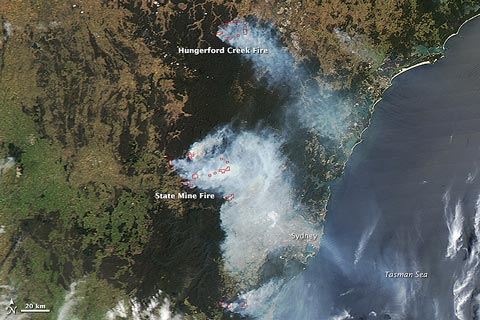 There’s a huge gap between the emissions reductions the New Zealand government says it wants to achieve, and what its current emissions trading scheme settings will deliver, according to modelling by the Ministry for the Environment. In this week’s post at The Daily Blog — No Clue, No Plan, No Future — I examine the disconnect between words and actions — and the lack of common sense on display on the government benches. Comments over there, please…
There’s a huge gap between the emissions reductions the New Zealand government says it wants to achieve, and what its current emissions trading scheme settings will deliver, according to modelling by the Ministry for the Environment. In this week’s post at The Daily Blog — No Clue, No Plan, No Future — I examine the disconnect between words and actions — and the lack of common sense on display on the government benches. Comments over there, please…
Australia’s burning – again
Smoke from the bush fires burning in the Blue Mountains blows over Sydney in this NASA Earth Observatory image captured yesterday. The scale of the fires and their impact on the skies over Sydney and much of New South Wales is prompting much discussion in Australia about the link between weather, climate warming and wildfires, and bringing international pressure to bear on new PM Tony Abbott’s plans to scrap carbon pricing. Here’s researcher Roger Jones, writing in The Conversation:
We found that fire danger in Victoria increased by over a third after 1996, compared to 1972-1996. The current level of fire danger is equivalent to the worst case projected for 2050, from an earlier analysis for the Climate Institute.
While it’s impossible to say categorically that the situation is the same in NSW, we know that these changes are generally applicable across south-east Australia. So it’s likely to be a similar case: fire and climate change are linked.
This early start to the fire season comes after a year of record warmth in Australia — the hottest summer on record, the hottest 12 month period (to September), and it’s looking odds on that calendar 2013 will be the warmest on record. NSW also had its second warmest winter on record, which helped to dry soils out more than usual. With summer still a month away, the prospect for SE Australia’s fire-prone states looks grim.
For historical background on Aussie bush fires, see this overview from Weather Underground expert Chris Burt, and keep up to date with excellent analysis at The Conversation by following the NSW bushfires 2013 tag.
[Update: For pithy comment, do not miss today’s First Dog On The Moon ((Do something about climate change you disingenuous muppet!)). ]
Something (early) for the weekend: grim forecast for oceans and the roots of denial
 Something of a miscellany today, coupled with an open thread, to keep you going during a brief pause in posting. First up: a study published this week in PLOS Biology looks at changes in ocean chemistry, temperature and primary productivity over the next century under two emissions scenarios, and finds that no corner of the ocean escapes untouched. From Science Daily:
Something of a miscellany today, coupled with an open thread, to keep you going during a brief pause in posting. First up: a study published this week in PLOS Biology looks at changes in ocean chemistry, temperature and primary productivity over the next century under two emissions scenarios, and finds that no corner of the ocean escapes untouched. From Science Daily:
“When you look at the world ocean, there are few places that will be free of changes; most will suffer the simultaneous effects of warming, acidification, and reductions in oxygen and productivity,” said lead author Camilo Mora, assistant professor at the Department of Geography in the College of Social Sciences at the University of Hawai’i at Mānoa. “The consequences of these co-occurring changes are massive — everything from species survival, to abundance, to range size, to body size, to species richness, to ecosystem functioning are affected by changes in ocean biogeochemistry.”
It’s been a productive few weeks for Mora: he was lead author on a recent study ((Full text, free!)) published in Nature that estimated when climate in different parts of the world would move beyond anything experienced in the last 150 years — have a play with this interactive map to find out when your part of the world will move into the unknown. See also Climate Central, Science Daily, and a huge amount of press coverage.
TDB Today: The Inconvenient Neighbours
 Over at The Daily Blog today, in a post headlined The Inconvenient Neighbours, I consider the case of the Kiribati man who is claiming refugee status in New Zealand because of the impact of sea level rise on his home island. With the IPCC report suggesting that sea level could rise by as much as a metre this century, it’s surely a sign of things to come…
Over at The Daily Blog today, in a post headlined The Inconvenient Neighbours, I consider the case of the Kiribati man who is claiming refugee status in New Zealand because of the impact of sea level rise on his home island. With the IPCC report suggesting that sea level could rise by as much as a metre this century, it’s surely a sign of things to come…
The last refuge of scoundrels
 Tomorrow, in the Appeal Court in Wellington (pdf), Justices Harrison, French and Miller will hear argument in the case of the NZ Climate Science “Education” Trust (NZCSET) versus the National Institute for Water and Atmospheric Research (NIWA), in the continuing effort of the cranks to litigate away warming in New Zealand over the last 150 years. According to the man who kicked off the whole process, Richard Treadgold of the “Climate Conversation” web site, the NZCSET bases its appeal on two main points:
Tomorrow, in the Appeal Court in Wellington (pdf), Justices Harrison, French and Miller will hear argument in the case of the NZ Climate Science “Education” Trust (NZCSET) versus the National Institute for Water and Atmospheric Research (NIWA), in the continuing effort of the cranks to litigate away warming in New Zealand over the last 150 years. According to the man who kicked off the whole process, Richard Treadgold of the “Climate Conversation” web site, the NZCSET bases its appeal on two main points:
The focussed grounds are that all three NIWA temperature series resulted from serious mistakes of fact, which impugned the rationality of the Crown Entity’s decisions.
This seems somewhat surprising, given that the judge in the original case was so scathing of the NZCSET’s expertise in his judgement delivered a year ago. One wonders how the Appeal Court will react to any attempt to relitigate the original decision, given Justice Venning’s findings. But then perhaps the whole appeal has rather more to do with the second basis for appeal:
The Coalition is also seeking reversal of the High Court’s costs order.
Costs of $118,000 were awarded against the NZCSET — a trust formed specifically to bring the original court case, and which did not legally exist until weeks after the original court documents were filed. Could it be that the trustees of the NZCSET, being Terry Dunleavy, Bryan Leyland and Doug Edmeades ((According to the certificate of incorporation: go here, click on Register Search, insert 2539286 in the appropriate box, and click “search”.)), aren’t happy to pay the costs incurred by their leader and legal eagle, Barry Brill? One hopes that they’re not planning to fold the trust in the event that their appeal isn’t successful, thus avoiding having to pay NIWA’s costs. After all, they founded the trust with lofty aims:
… to promote a heightened awareness and understanding of, and knowledge about, the climate, environment and climate and environmental issues among scholars and researchers, members of the professions and members of the public… (see Sec 4.1.1 of the certificate)
I have a few questions for the trustees:
- How much money has the trust disbursed amongst scholars and researchers since it was established on July 30, 2010? Over three years of fund raising and charitable endeavour has surely delivered more than a footling little court case?
- In what ways, other than by bringing an unsuccessful court case, has the trust “heightened awareness and understanding of climate”?
- In the event that you are unsuccessful in your appeal, are you planning to pay up in full for the costs awarded against you by Justice Venning? If not, why not?
I eagerly await assurances from the NZ Climate Science Education Trust that their laudable education effort continues, and that it has adequate funds to meet the costs they’ve incurred by taking NIWA to court. No doubt they will have plans for further and more productive education efforts in the near future. But I won’t be holding my breath…
Update: Tuesday 15th @ 3-50pm
Word reaches me that the NZCSET have just capitulated and abandoned their appeal against Justice Venning’s decision — in other words, a comprehensive victory for NIWA and a further vindication of the work done by their team on the NZ temperature record. The Appeal judges have reserved their judgement on costs, but it’s possible that the NZCSET’s legal bill might just have increased a fair bit.

